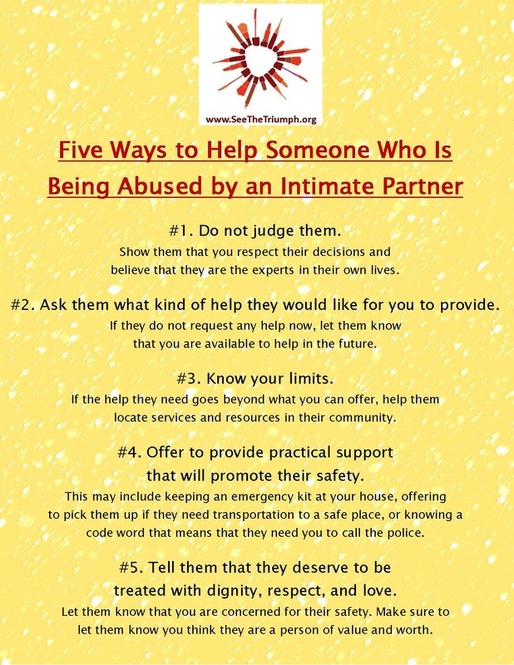|
10/11/2014 0 Comments Step 1: Remain Non-Judgmental (How to Help a Friend in an Abusive Relationship)By Christine Murray, See the Triumph Co-Founder
Imagine you’re on the outside of an abusive relationship, looking in. Suppose the person being abused is someone you know and care about. You’ve probably witnessed or heard about the way their partner treats them. Maybe they’ve even come to you for help, and you offered your advice and support, and then you were upset when they returned to the relationship. You’re confused and frustrated because you don’t understand their choices. It may be tempting to look at the person being abused and wonder things like, “What are they thinking?” or even, “What is wrong with them that they’d stay with their partner when they’re getting treated so terribly?” But now, imagine, for a moment, that you are the one who is being abused by your partner who supposedly loves you. You probably still love them, or at least you loved them at one point. If you’ve been together for a long time, you share many aspects of your life with that person--maybe you have children together, or you own a house together. You may share friends, hobbies, a social circle, and even dreams for the future. You have some good memories of happy times you’ve shared, and it’s hard to imagine life without your partner. And still, this person hurts you. Maybe not all the time, but they’ve hurt you--whether physically and/or emotionally--in ways that you know, at least on some level, are not right. You may fear for your safety if you stay with your partner, but they also may have threatened to hurt you even worse if you leave. Not only are you afraid of what your partner may do to you, but you’re also scared of the other consequences you could face if you ended the relationship--which might include living in poverty, losing time with your children, and losing friendships. Just how different is the view from the outside, compared to the inside, of an abusive relationship? From the outside looking into an abusive relationship, it can be tempting to judge a person who is staying with someone who is hurting them. However, from the outside, it’s nearly impossible to know the full story of how that person thinks and feels about their relationship, as well as their reasons for staying with their partner. For this reason, our first suggested step to helping someone who is involved in an abusive relationship is to try your hardest to avoid judging that person and their decisions. I know this is not easy. In fact, it can be extremely difficult. It may even seem impossible, especially if you're emotionally invested in the person who is being hurt. Not only can it make you feel confused because you don’t understand their reasons for staying, but also you may feel sad and scared, as you want that person to be safe and respected. I have never met, or even heard of, an abused person who actually wanted to be abused or did anything to “deserve” being treated that way. I can tell you this based on my experiences as a counselor, as well as through our research with hundreds of survivors, in addition to my experiences teaching, doing trainings, and numerous other work and volunteer experiences through which I’ve interacted with people who had personal and professional experiences related to intimate partner violence. Of course, I have known people who were being abused who didn’t want their relationships to end, but they always wanted the abuse to end. Always. Their reasons for wanting to remain in their relationships were diverse. When we begin to fully appreciate the complexity of people’s lives, we can see that very rarely are there clear-cut, easy answers as to whether a significant intimate relationship should end or continue. Even when the answer seems simple, the steps required to end that relationship can be very, very difficult. In some cases, those steps are life-threatening. Therefore, we suggest that the first step to helping a person who you know or suspect is being abused is to approach the situation and the person with a non-judgmental, supportive perspective and an open mind. Any judgment that the person perceives from you could lead them to turn away from you and view you as unhelpful, regardless of how positive and supportive your intentions may be. Three statements you can make to remind yourself to remain non-judgmental are: * “I don’t know the whole story.” * “I have no idea how I would respond if I was in this person’s exact same situation.” * “I can best help this person by supporting them, not judging them.” Although this is the first step we suggest, we know it may be one of the most difficult. However, it is also perhaps the most important step in being able to help and support someone who is being abused. By providing a supportive, nonjudgmental presence for that person, you can provide a powerful statement about how important it is to understand and honor their value as a person, as well as their unique perspective on their situation and relationship.
0 Comments
Leave a Reply. |
Archives
July 2024
CategoriesAll About Intimate Partner Violence About Intimate Partner Violence Advocacy Ambassadors Children Churches College Campuses Cultural Issues Domestic Violence Awareness Month Financial Recovery How To Help A Friend Human Rights Human-rights Immigrants International Media Overcoming Past Abuse Overcoming-past-abuse Parenting Prevention Resources For Survivors Safe Relationships Following Abuse Schools Selfcare Self-care Sexual Assault Sexuality Social Justice Social-justice Stigma Supporting Survivors Survivor Quotes Survivor-quotes Survivor Stories Teen Dating Violence Trafficking Transformative-approaches |
Search by typing & pressing enter



 RSS Feed
RSS Feed